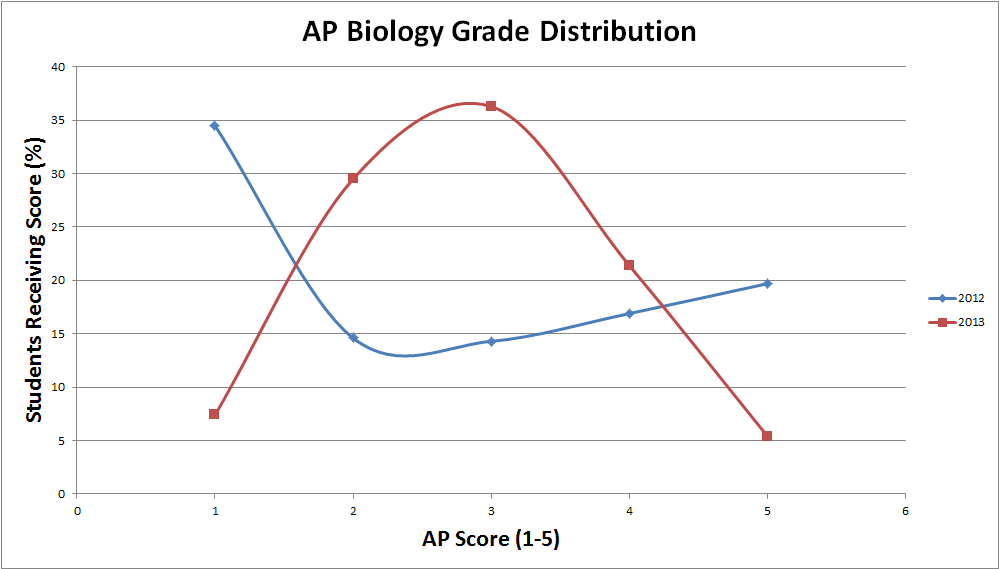AP Biology Changes Poorly Implemented
The mixed reactions following the 2013 exam and what may lie ahead
A comparison: AP Biology grade distribution in 2012 and 2013. Data taken from College Board’s Student Score Distributions
It’s something students have a love-hate relationship with: it can exempt you out of introductory college classes filled with hundreds of students and can give you time to graduate early or study abroad, but can cause much stress during two weeks of May. The Advanced Placement (AP) program is run by the College Board, the nonprofit that also administers the SAT, and consists of thirty-four classes and exams that are taken by millions of students each year. The classes are considered equivalent to an introductory college course in that subject, and the exams include all of the material covered during the school year and are graded on a scale from one to five. If a student passes an exam, achieving a score of three or higher, some colleges will give the student credit for an equivalent college class or allow them to place into a more difficult course. However, some colleges will only accept scores of four or five.
To respond to teacher concerns and changing educational standards, College Board has recently updated the syllabus and exam format for a few courses. The 2012-2013 school year was marked by modification of three exams: Biology, Latin, and Spanish Literature and Culture. This isn’t the first time that College Board has made major overhauls to the program. In the past five years, four exams (Italian, Computer Science AB, French Literature, and Latin Literature) have been discontinued, and in 2010 College Board announced that students would no longer receive a score penalty for wrong answers on the exams. This year’s changes impact one of the most frequently taken courses among students, Biology (almost 192,000 students nationwide took the exam in 2012). Additionally, in the next two years the syllabi for the Chemistry, Spanish Language and Culture, US History, and Physics B classes, all popular nationwide, will be changed.
Across the redesigned exams, College Board appears to deemphasize memorization of facts and figures and stress the importance of critical thinking and problem solving skills. Most of the new exams consist of fewer multiple choice questions and more free response questions, giving students a greater opportunity to use analytic thinking skills. Furthermore, because the old AP courses covered so much material, it was difficult for teachers to focus on specific topics in depth. Eliminating some of the topics covered in previous years (or extending a one year course into two years, as College Board plans to do with Physics B), will allow for teachers to spend more time on the remaining material.
AP Biology, a recently changed course, is among the most popular AP classes at Berkeley with 48 test-takers last year. According to College Board’s new AP Biology Course and Exam Description, some AP Biology teachers felt challenged with the amount of material to be covered in previous years, especially balancing breadth of coverage and depth of understanding. Consequently, these teachers felt forced to sacrifice depth, laboratory skills, and analytic skills to complete the older curriculum. As biology is a rapidly expanding field, balancing breadth and depth in an introductory course is difficult to execute. In teacher materials found on College Board’s website and accessed through Brookings School District’s site, College Board admitted the past curriculum also lacked specificity concerning how students should be able to apply their knowledge. Additionally, according to Fox Business, a large number of teachers noticed an alarming trend across the United States: students entering into AP classes, including AP Biology, were less prepared than in the past.
To respond to these concerns, College Board restructured the AP Biology curriculum into four “Big Ideas” and seven “Science Practices” intended to shift focus from content coverage to conceptual understanding of topics and the links between them. After completing the course, College Board believes students should now have an enduring set of skills to prepare them for college-level science, rather than a large amount of information. However, responses from Berkeley students regarding the changes to the Biology exam have been critical overall. Following this year’s exam, senior Morgan Brazel said, “The AP Bio exam was basically the same thing as the ACT Science Section. You didn’t actually have to know much bio to do well.” Senior Max Franzblau added, “The exam was focused more on critical reading and comprehension than biology.”
Furthermore, the new heavy emphasis on inquiry based labs can easily produce difficulties for many high schools, as labs take up a large amount of time and space. In college, students have many hours each week devoted entirely to labs, a luxury that a high school student’s busy schedule simply doesn’t allow. Overall, these changes are intended to more effectively align AP Biology with College Board’s goal of providing “a gateway to success in college.”
The suddenness and execution of the change, however, have left many AP Biology students and teachers displeased. “Campbell’s Biology In Focus,” the new textbook designed for the new AP Biology exam, was published earlier this year, and later this year College Board plans to release the first full exam. Simply put, students taking the 2013 exam had a somewhat more limited pool of resources to prepare for the new exam— only College Board’s sample questions and a few review guides published mid-autumn. Perhaps the release of more exam information earlier, if feasible, could have avoided a number of these concerns, as it would have given both teachers and students more time to prepare.
The nationwide drop in fives on the AP exam from 19.7% of students in 2012 to 5.4% of students in 2013 came without advanced warning and shocked both students and teachers alike. At the 2013 AP Annual Conference over the summer, College Board explained, “the new four is the old five,” and this philosophy is the new “gold standard” of AP exams. However, Upper Division AP Biology teacher Martha DeWeese who attended this conference said that she and many of the other veteran teachers “were blindsided” and “couldn’t prepare [their] students” for the new scoring or the new exam. She said, “[College Board] could never really make us understand why it went from 19 to 5 without any warning.” However, she added, “[the change] doesn’t really bother me as long as the colleges understand it.” The biggest concern she and the other teachers shared was if “the admissions [officers] are really cognizant of this change that is being made.” While a number of other AP exams have similarly low five percentages, this drop caught many off-guard. Interestingly, the percentage of ones given also experienced a drop from 34.5% in 2012 to 7.4% in 2013 while the relative number of twos and threes given more than doubled, increasing the pass rate from 50.9% in 2012 to 63.1%. However, only 26.8% of students received a four or a five this year, down from 36.6% the year before. Despite the rapid and sweeping changes to the AP Biology curriculum and exam, the 48 Berkeley test-takers this year performed extremely well, scoring above four on average.
The new scoring in AP Biology may be evidence of College Board’s effort to combat an increasing number of colleges who don’t accept some AP credits. Dartmouth College, for example, recently changed their policy to no longer accept any AP scores. Professor Hakan Tell, chair of the committee that proposed the changes, praised AP classes as “extremely useful and valuable” for students in high school, but he does not believe they are comparable to college courses. In fact, Dartmouth found that a mere 10% of students scoring a five on the AP Psychology exam could pass Dartmouth’s introductory psychology placement exam. The increased difficulty of achieving a five may address these concerns. DeWeese said that at the conference, College Board explained that students now receiving fives in AP Biology “have what they need to exempt the class and be a science major.”
However, the reduced number of fives given may also be an effort to reverse the national trend of grade inflation. The Dean of Academics at Princeton, a school known for its rigorous opposition to grade inflation, explained her view to the New York Times: “When students get the same grade for outstanding work that they get for good work, they are not motivated to do their best.” On the other side, the decreased percentage of ones may be a response to teachers’ complaints of underprepared students taking the course. Jeff Livingston, senior vice president of College and Career Readiness at McGraw-Hill Education told Fox Business, “While AP enrollments are on the rise, the reality is that the vast majority of new AP class takers are not becoming AP exam passers. These students are unprepared for the rigors of college level coursework in high school.” Supporting Livingston’s statement, over 50% of national AP Biology test-takers answered zero or one out of five grid-in math questions correctly according to materials released by College Board.
While College Board made a sincere effort to respond to national concerns, we believe the implementation of these changes could have been better executed. We ultimately agree with the principles behind these changes, but we think College Board should reevaluate the balance of content-coverage and pure analytic skills in the exams, in addition to the timeline used for implementing the exam changes. Hopefully, feedback from students and teachers will be quickly incorporated to facilitate a smoother testing experience for changed courses in the future.

Emily is a senior who previously served as the production editor and a sports writer. In addition to her work with the paper, she also is the president...
Theo, a former News Editor and staff writer, is currently enjoying the second semester of his senior year—a phase marked by excessive Netflix binging....












